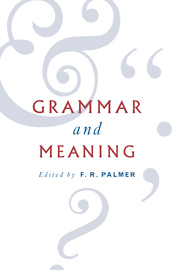Book contents
- Frontmatter
- Contents
- List of contributors
- Foreword
- 1 Polysemous relations
- 2 Fields, networks and vectors
- 3 Syntax, semantics, pragmatics
- 4 Natural-language interpretation as labelled natural deduction
- 5 Three levels of meaning
- 6 Does spoken language have sentences?
- 7 Grammaticalisation and social structure: non-standard conjunction-formation in East Anglian English
- 8 German Perfekt and Präteritum: speculations on meaning and interpretation
- 9 The possessed
- 10 Complement clauses and complementation strategies
- 11 Grammar and meaning
- John Lyons: publications
- Index
9 - The possessed
Published online by Cambridge University Press: 30 January 2010
- Frontmatter
- Contents
- List of contributors
- Foreword
- 1 Polysemous relations
- 2 Fields, networks and vectors
- 3 Syntax, semantics, pragmatics
- 4 Natural-language interpretation as labelled natural deduction
- 5 Three levels of meaning
- 6 Does spoken language have sentences?
- 7 Grammaticalisation and social structure: non-standard conjunction-formation in East Anglian English
- 8 German Perfekt and Präteritum: speculations on meaning and interpretation
- 9 The possessed
- 10 Complement clauses and complementation strategies
- 11 Grammar and meaning
- John Lyons: publications
- Index
Summary
Concord, rection and dependency
Concord and rection both involve the assignment of a value (term) for a morphological category or categories to a victim word by a trigger or controller. Traditionally, they are differentiated, roughly, in terms of the substantive role of the trigger (see e.g. Matthews, 1981: 246). Thus, the Latin sentence in (1):
(1) Hostis habet muros.
‘The enemy holds the walls.’
can be said to show concord between subject (hostis, the trigger) and verb (habet, the victim), which latter is said to agree with the subject - that is, is assigned (some of) the same category values, singular number and third person; while assignment of the value for the case category (accusative) to the post-verbal argument (muros) is simply determined by presence of the verb (in Latin, of a particular class) - it is not a copy of a category also manifested in the structure of the verb and thus is rectional.
This brief formulation of the traditional characterisation of concord and rection is in need of some refinement. It is not obvious that all concord, for instance, involves simply the copying of a particular member of a category. For example, a controller involving co-ordinate items of discrepant gender may trigger yet another gender selection in the victim (see e.g. Corbett, 1983, 1989, on this and other complications). But it is at least appropriate to attribute the same particular morphological category to both trigger and victim, whatever the mechanisms of matching the members (apart from simple copying).
- Type
- Chapter
- Information
- Grammar and MeaningEssays in Honour of Sir John Lyons, pp. 162 - 174Publisher: Cambridge University PressPrint publication year: 1995



